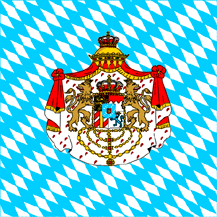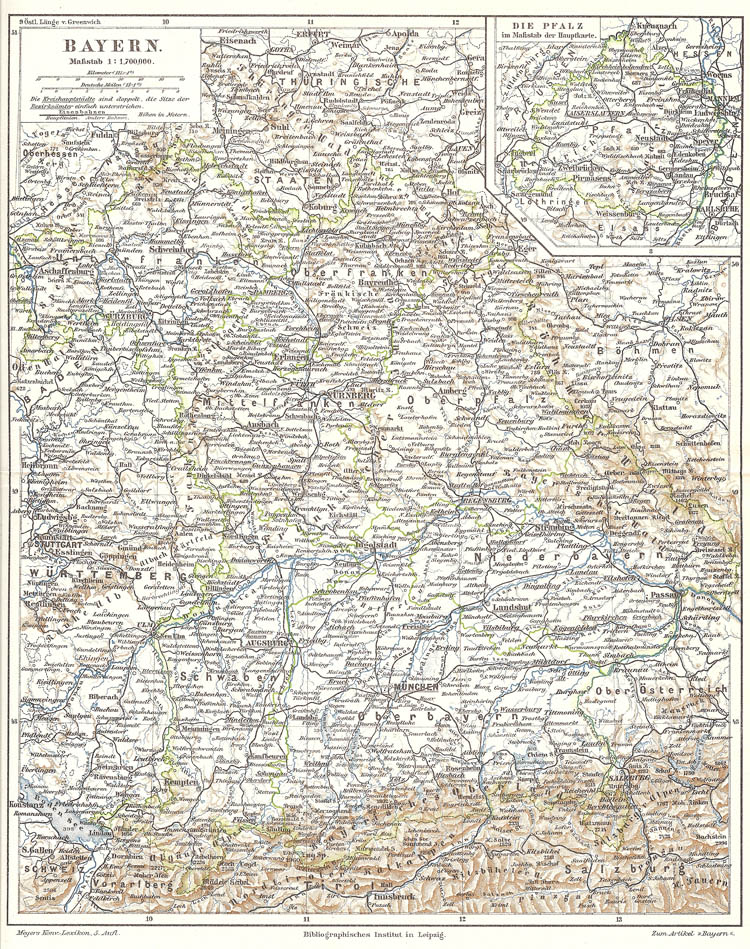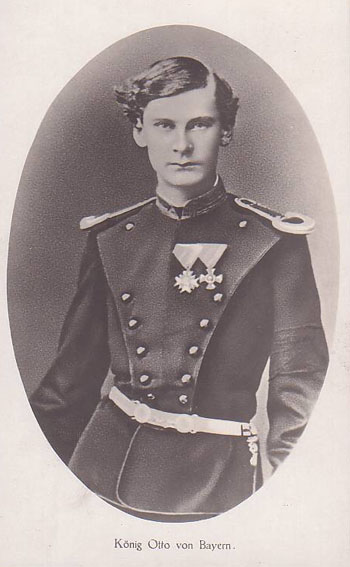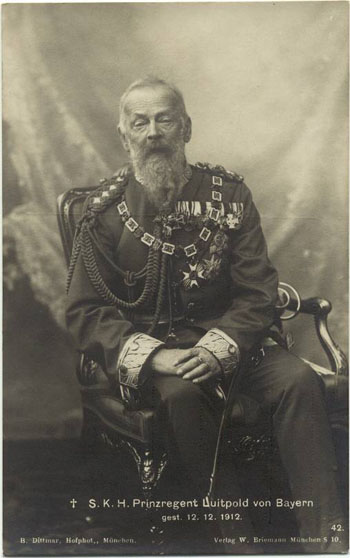(1813-1871: Bayern)





The Kingdom of Bavaria, a German state since the tenth century, became a member state of the German Confederation between 1815 and 1866. Bavaria fought on Austria’s side in 1866, lost, and gave up a small enclave in Thüringia called Kaulsdorf, the Bezirksamt Gersfeld, the Landgerichtsbezirk Orb, and an indemnity of 30 million guilders. After the 1866 war, Prussia, opposed the suggestion that the southern states should join the North German Confederation in order not to alarm France. However, there was an offensive and defensive alliance between Bavaria and Prussia. Bavaria no longer had "a need of France," and in the War of 1870-71, the Bavarian army joined Prussia, under the command of the Prussian Crown Prince, against France. It was King Ludwig II’s proposal that the imperial crown be offered to King William I of Prussia. Bavaria became a state of the Imperial German Empire in 1871; however, she reserved certain separate privileges (Sonderrechte) in respect to the administration of the army, the railways, the mail, and the excise duties on beer, the rights of domicile and the insurance of real estate. The King of Bavaria was the supreme chief of the Bavarian army. Though Bavaria became an integral part of the new Imperial German empire, she reserved a larger measure of sovereign independence than any of the other constituent states. Thus, she retained a separate diplomatic service, military administration, postal, telegraph and railway systems. Bavaria had six votes in the Bundesrat and sent forty-eight deputies to the Reichstag. The Wittelsbach dynasty was the hereditary ruling family. The Kingdom was a hereditary constitutional monarchy and the Parliament had two chambers. The upper house of the Bavarian parliament (Kammer der Reichsräte) was composed of various royalty, bishops, and appointees. The lower house (Kammerder Abgeordneten) or chamber of representatives consisted of 159 deputies, based on a population split of the census of 1875. Voting was universally secret and direct. The majority of the inhabitants (about 70 percent) were Roman Catholics. The Protestant-Evangelical Church claimed about 29 percent. The Bavarian chambers ratified the incorporation treaty on 21 January 1871, though not without considerable opposition. The Kulturkampf increased the hostility, as did the 1870 Dogma of Papal Infallibility. Bavaria proclaimed a federal law that expelled the Jesuits on 6 September 1871 and was extended to the Redemptorists in 1873. Bavarian Sonderrechte, founded on traditional racial and religious antagonism to the Prussians, continued but was seen officially only in the limitation to display only the Bavarian flag on public buildings on the emperor's birthday; a provision which was modified to allow the Bavarian and imperial flags to be hung side by side.
Bavaria had a military treaty with Prussia from 23 November 1870. Prior to that, there was a mutual defense alliance that placed the Bavarian army under the Prussian king during time of war. What made Bavaria significantly different than the other states was that Protestants 61-68 of the North German Confederation Constitution did not apply to Bavaria. As these were the military clauses, Bavaria maintained significant independence in military matters. Section IX of the Imperial German Constitution specifically references the treaty. Similar to the other kingdoms of Saxony and Württemberg, there were two Bavarian infantry regiments garrisoned in Lorraine. However, due to the treaty of 1870 these were under control of the Bavarian II Corps in peacetime, rather than the corps area in which they were stationed. The Bavarian army formed a separate portion of the army of the German empire, with a separate administration. There were three separate Bavarian army corps and Bavarian regiments did not participate in the sequential numbering of the Prussian army. The regulations applicable to other sections of the whole imperial army were observed.
There were some strange maneuvers for the crown. Ludwig II was king from 1864-1886. He bankrupted the country building fairytale castles and hosting Wagner concerts. He drowned mysteriously. Otto became King of Bavaria upon his older brother's death in 1886, but never truly ruled as King and was by some accounts not even aware that he had become King. Otto suffered from severe mental illness and had been declared insane in 1875. He was confined in Fürstenried Palace under medical supervision until his death. Otto's uncle, Prince Luitpold of Bavaria, served as Prince Regent for Otto until Luitpold's death. Luitpold's son Ludwig then became the next Prince Regent. The constitution of Bavaria was amended on 4 November 1913 to include a clause specifying that if a regency for reasons of incapacity lasted for ten years with no expectation that the King would ever be able to reign, the Regent could proclaim the end of the regency and assume the crown himself. The following day, Otto was deposed by his cousin, Prince Regent Ludwig, who then assumed the title Ludwig III. Otto was permitted to retain his title and honors, which he did until his death in 1916.
Bavaria maintained its own diplomatic corps and sent ambassadors to Switzerland, Belgium, France, Baden, Hesse, Württemberg, Austria-Hungary, Italy, the Vatican/Papal States, Russia, Prussia, and Saxony. Consuls were maintained for trade with Baden, France, Great Britain, Italy, Austria-Hungary, Prussia, Saxony, Belgian, Greece, the Netherlands, Persia, Portugal, Sweden, Norway, Switzerland, Spain, USA, Argentina, Bolivia, Brazil, Chile, Colombia, Denmark, Mexico, Panama Paraguay Peru, Rumania, Russia, Serbia, Spain, Turkey, Venezuela, and Württemberg.
The capital city was Munich, 4th largest city in the empire. The population of Bavaria was 7.1 Million in 1914.
(Kaiserliches Statistisches Amt, 1914)